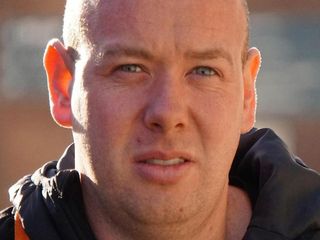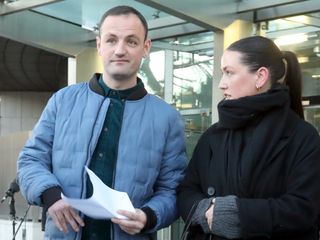Fr Brian D'Arcy: If taking of life in womb and old age legalised how can we say suicide is wrong?
‘I hate to remind you, but every one of us (including me) will die one day’
Stock image
All over the world, including Ireland, there is a concerted movement to pass laws claiming to give us “the right” to decide when we die, and how we die, so as to avoid pain and suffering.
I hate to remind you, but every one of us (including me) will die one day. No matter how we sugarcoat it with “pass away” or “passed” or even “pass on”, we can’t avoid dying. We just don’t know when. I can live with that — there are many who cannot.
My personal conviction is that we don’t choose either birth or death. There is a higher power who decides such momentous events. There are others who have a different perspective and I have to respect their convictions as I hope they respect mine.
We need to think through the implications of changing the law.
Society is struggling to explain why so many take their own life now. We are rightly horrified by the rise in deaths by suicide, particularly among young men. But if the State legalises the deliberate taking of life in the womb and in old age, it becomes impossible to argue that suicide at other times is wrong. We cannot have it both ways.
One good thing is that the movement to pass laws permitting assisted suicide is actually forcing us to think about the sacredness of life itself.
There is widespread misinformation about death. Many believe Catholic theology requires prolonging life for as long as possible; this is not true. As far back as the 16th century, Catholics taught that one does not have to use “extraordinary means” to prolong life.
Furthermore, the use of drugs to overcome pain is not only allowed but encouraged, “even when the result is decreased consciousness and a shortening of life.”
The US Catholic bishops — who are by no means a liberal bunch — wrote recently: “The duty to preserve life is not absolute, for we may reject life-prolonging procedures that are insufficiently beneficial or excessively burdensome.”
Most moral experts, however, oppose euthanasia — the direct killing of a person, as in assisted suicide. Assisted suicide is legal in nine states in the USA. There has been a process of softening up people’s attitudes to the idea of assisted suicide in the same way that other forms of ending life, including abortion, have slipped into law. I know from my dealings with people at the end of life, that a growing number believe assisted suicide is ‘acceptable.’
Modern society has a universal fear of suffering. Advances in medical science convince us that life can be prolonged, but when old age actually arrives, we cannot cope and claim the ‘right’ to end life on a whim.
Another fear is that prolonging death will lead to huge medical expenses which can bankrupt the dying person’s family. Believe me, it is a real problem.
American theologian Thomas Reece recently describes what happens. “Those supporting assisted suicide tout it as a free choice made by rational people. In reality, people requesting suicide may be suffering from depression or inadequate pain medication.
“There is also a danger of coercion from people who do not want to bear the expense of caring for the dying. Assisted suicide would certainly reduce the costs to insurance companies and to government programmes.”
The question is: How free are such decisions?
I spend much of my life accompanying patients on their last journey in this life. I have always believed that this should be a time for love, compassion and reconciliation. I’ve experienced beautiful times with patients, their families and the caring professions, especially in hospice care.
Sadly I have also witnessed people being cast aside because they no longer contribute to society. The excuse often used by families and others is that they don’t want to see their relatives suffering on and on. The fact is though that unbearable suffering is rarely an issue for most patients in this day and age.
There is no justification to prolong life through extraordinary means; nor should we cut life short because WE can’t cope with THEIR pain.
Read more
‘Caring for People at the End of Life,’ has good advice: “What distinguishes ‘ordinary’ from ‘extraordinary’ in Catholic moral theology is not whether the treatment is ‘ordinary’ in the sense of being normal or frequently used, but rather whether the treatment is beneficial (ordinary) or excessively burdensome (extraordinary) to the patient.”
Does “a particular medical intervention or procedure offer a reasonable hope of benefit to the patient that is not excessively burdensome”?
At the start of an illness, it is perfectly acceptable to experiment with a variety of interventions. But if the illness is at an advanced stage, interventions may be neither practical nor helpful. It is right to honestly assess the situation. It is not abandoning the person; it is rather admitting the limits of medicine.
For example, at the beginning of a cancer diagnosis, it is right to try many forms of chemotherapy etc, but in the latter stages treatment might have to be discontinued because it is no longer of benefit and may even be harmful.
The family, the patient and the medical team together need to balance the pain inflicted with the chances of overcoming the illness and the questionable value of causing unjustified pain to someone who needs to be freed from their hopeless situation.
In former times, death was hard to ignore because people died at home surrounded by their families. Even children saw death as a common occurrence. Now everything, including death, has to be sanitised.
Finally, every family should have conversations about death and funerals. There is nothing worse than a family dispute in a hospital room over what to do with their mother when she dies. Such rows can be avoided if people make their desires known to their relatives before they get sick. Initiating such a conversation with an elderly relative requires diplomacy, but their voice deserves to be heard.











































